It’s National Savings Month in Mzansi, which means now’s the perfect time to rethink your money moves – especially when it comes to buying your first or next car. Most South Africans have been there – standing at a car dealership, keys in hand, dealer saying “You can drive this beauty home today with zero deposit.” In a market where petrol prices keep rising and insurance rates climbing, the idea of skipping the upfront payment can feel like a win.
But here’s the thing: that zero-deposit offer might cost you more than you think. Saving up a deposit before signing the dotted line can reduce your monthly payments, cut your interest charges, and fast-track your financial freedom.
So why are you still being offered the “easy” way out?
Let’s face it – getting approved for vehicle finance isn’t just about your credit score. When you put down a deposit, you’re reducing the bank’s risk. They’re lending you less money, which makes approval much easier, especially if your credit history isn’t spotless.
For example, if you’re buying a R250 000 car with a R50 000 deposit you’re asking the bank to finance just R200 000 instead of the full amount. Lower risk often means better terms and higher approval chances and more negotiating power to you. Makes sense, right?

Interest Rate Advantage
Deposits do more than shrink your loan—they could also unlock a better interest rate. Lenders often reward customers who demonstrate financial discipline with lower rates.
Let’s say you’re financing a R300 000 car over 60 months at 12% interest, you’d pay about R180 000 in interest with no deposit. Put down R60 000 deposit instead, and you’re looking at around R144 000 in interest charges instead – that’s a saving of R36,000. That’s more than your original deposit back in your pocket.
Lower Repayments, More Flexibility
With a deposit in play, you can structure your loan to suit your lifestyle. You might choose lower monthly repayments, shorten the loan term to become debt-free faster, or find a sweet spot between the two.
As Lebo Gaoaketse, Head of Marketing at WesBank, puts it: “The bigger the deposit, the quicker you reach that sweet spot where your car’s trade-in value matches what you still owe.”
This equity gives you freedom. When you’re ready to upgrade, you’re not stuck in a car that’s worth less than the loan balance.

The Psychological Benefits
Beyond the numbers, there’s something powerful about owning a bigger chunk of your car from day one. You’re not just making payments on something the bank owns – you’re building equity in an asset you partially own. This psychological ownership often translates into better car care too. Ever wonder why some people baby their cars while others don’t? It’s usually about how much they’ve invested upfront.
The Practical Side of Saving
Saving doesn’t have to be painful. R2 000 a month adds up to R24 000 in a year – a meaningful deposit that can shift your entire loan equation.
Set up a dedicated savings account with automatic monthly transfers and let time do the work. You’d be surprised how far small sacrifices—less takeout, fewer spontaneous online buys—can take you.
Use Tech to Run the Numbers
Tools like the WesBank Vehicle Finance Calculator let you test-drive your financial options before you commit. Play around with deposit sizes, loan terms, and interest rates to see how they affect your monthly payment—and your total repayment.
For example, adding just R15 000 to your deposit could shave R30 000 off your loan over time. It’s real money back in your pocket.

The Trade-In Factor
A deposit creates equity from the start, giving you more options when you’re ready to upgrade. Without a deposit, you might find yourself “upside down” on the loan for years – owing more than the car’s worth. A deposit reduces this risk significantly. Trust us, you don’t want to be stuck in a car you can’t afford to trade in.
There are exceptions. If putting down a deposit would empty your emergency fund or push you into credit card debt, it might not be the best move. Likewise, if you qualify for a truly zero-interest loan (rare, but not impossible), it could be smarter to keep your cash invested elsewhere.
But these cases are the exception – not the rule.
Your deposit decision should reflect your financial reality, not dealership pressure. For many buyers, a few extra months of saving could mean years of lower payments, better rates, and more breathing room.
So before you jump at that “zero down” deal, run the numbers using a reliable finance calculator. Find the balance between deposit, monthly repayment, and loan term that fits your budget—and your future.
Because your first car shouldn’t just move you forward — it should make financial sense too.
You might also like
More from Cars
2025 Land Rover Discovery D350 Review: The Ultimate Family SUV for Mzansi Road Trips
To truly test the 2025 Land Rover Discovery D350, we took it on an epic 3,000km journey from Johannesburg to …
2025 Audi A5 Sedan First Impressions: Sleek, stylish and worrisome
After three decades, the Audi A4 has been replaced by the all-new 2025 A5 Sedan. The A5 promises to carry …
Nissan’s New Navara Stealth Roars Back Onto SA Roads – Pricing
After a six-year hiatus, the locally built Nissan Navara Stealth is back - and louder than ever. Nissan has officially reintroduced …








